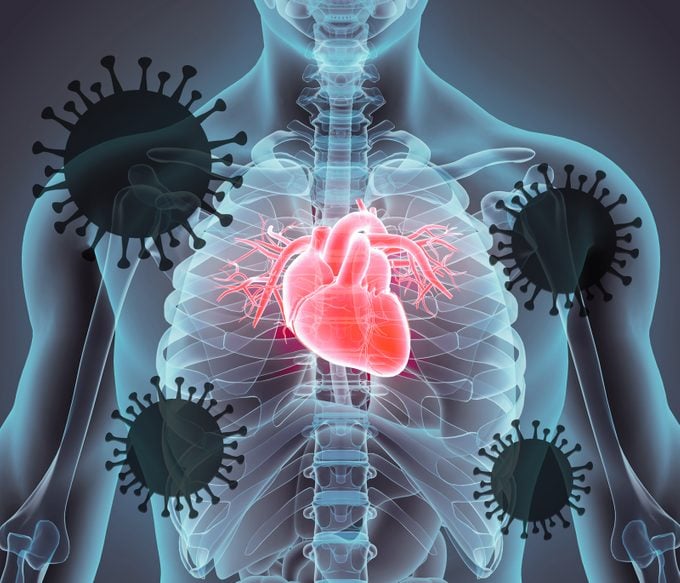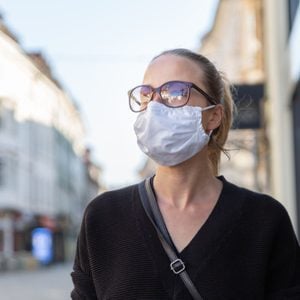This Is How Damaging Covid-19 Can Be For Your Heart
Updated: Mar. 30, 2022
You don't have to be critically ill to suffer heart damage from Covid-19. The virus can cause heart trouble for people who had no symptoms at all.
When health experts first began to track the novel coronavirus, they believed the infection it causes—Covid-19—primarily targeted the lungs. But then they noticed something else: 20 to 30 percent of people hospitalized with Covid-19 showed signs of heart damage, according to a study published in June 2020 in Heart Rhythm. Researchers initially chalked this up to the fact that the patients were so critically ill—it made sense their hearts would suffer as well.
But as ongoing research sheds light on the effects of Covid-19, a clearer picture has emerged. It isn’t just critically ill patients who have heart damage. A study published in September 2020 in JAMA Cardiology shows that the virus can harm heart tissue even in those who had mild symptoms or none at all. And though it’s too soon to be certain, a study published in the July 2020 issue of JAMA Cardiology suggests the damage may be permanent.
“This virus infects virtually every organ in the body, and the heart is no exception,” says Oscar Cingolani, MD, director of the hypertension program and associate professor of medicine in the cardiology division at Johns Hopkins University Hospital in Baltimore.
The culprit? Inflammation.

When the heart becomes inflamed
What cardiologists call “myocarditis”—or inflammation of the heart muscle—can weaken your heart and wreak havoc with your heart’s electrical system. That, in turn, makes it harder for your heart to pump blood and causes abnormal heart rhythms.
Not a new condition, myocarditis can be caused by viruses like the flu, as well as bacteria, fungi, or autoimmune diseases. What’s become increasingly clear is that “the coronavirus can infect the heart like other infections do,” says Dr. Cingolani. “The heart may also become damaged by the inflammation that the body produces to fight the infection.”
In the September 2020 JAMA Cardiology study, researchers screened 26 college athletes who had recovered from Covid-19. In four of the athletes, MRIs showed inflammation of the heart muscle. Two of them, however, had experienced no symptoms of Covid-19. “We don’t know yet the long-term consequences of this,” says Dr. Cingolani. But “it’s important that we pay close attention to people engaged in sports and follow them accordingly.”
Damaging results
Covid-19 also damages what’s known as endothelial cells. Those are the smooth-surface cells that create a barrier inside the vessels for blood to flow. “When these cells become infected, a number of protective mechanisms get compromised,” says Dr. Cingolani. Blood can clot in the small arteries, he explains, and the result can lead to small scars and areas of inflammation or even a heart attack; clots in the lungs’ arteries can deprive the heart of oxygen, says Dr. Cingolani.
Other ways Covid-19 targets the heart:
- Stress cardiomyopathy (or broken heart syndrome): Viral infections can cause cardiomyopathy, a heart muscle disorder that affects the heart’s ability to pump blood effectively. When attacked by a virus, the body undergoes stress and releases a surge of chemicals called catecholamines that can stun the heart, says Dr. Cingolani. “It’s usually transient, but it can also be fatal if not taken care of properly.” A study published in July 2020 in JAMA Network Open found that the incidence of stress cardiomyopathy has nearly tripled during the pandemic. Normally, the rates range between 1.5 and 1.8 percent; they’ve now surged to 7.8 percent.
- Heart attack: Covid-19 increases the possibility of having what’s known as a myocardial infarction (heart attack) in patients with cardiovascular risk factors.
- Arrhythmias: Irregular heartbeats are benign most of the time, causing only palpitations, says Dr. Cingolani. But they can also be severe.
What you can do
The very best protection? Limit your exposure to the virus—social distance, wear a face mask, and stay away from large social events or gatherings. If you think you may have been exposed to the virus, pay attention to how you feel. Should your energy drop or you find yourself breathing harder than usual during normal activities, contact your doctor. There are medications that can reduce heart inflammation; also, your doctor may suggest avoiding strenuous exercise for a few months.



